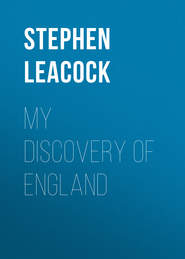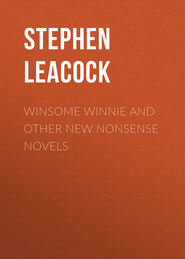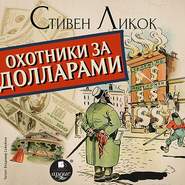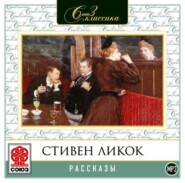По всем вопросам обращайтесь на: info@litportal.ru
(©) 2003-2024.
✖
The Hohenzollerns in America
Автор
Год написания книги
2019
Настройки чтения
Размер шрифта
Высота строк
Поля
6.—Fetching the Doctor: From Recollections of Childhood in the Canadian Countryside
We lived far back in the country, such as it used to be in Canada, before the days of telephones and motor cars, with long lonely roads and snake fences buried in deep snow, and with cedar swamps where the sleighs could hardly pass two abreast. Here and there, on a winter night, one saw the light in a farm house, distant and dim.
Over it all was a great silence such as people who live in the cities can never know.
And on us, as on the other families of that lonely countryside, there sometimes fell the sudden alarm of illness, and the hurrying drive through the snow at night to fetch the doctor from the village, seven miles away.
My elder brother and I—there was a long tribe of us, as with all country families—would hitch up the horse by the light of the stable lantern, eager with haste and sick with fear, counting the time till the doctor could be there.
Then out into the driving snow, urging the horse that knew by instinct that something was amiss, and so mile after mile, till we rounded the corner into the single street of the silent village.
Late, late at night it was—eleven o'clock, perhaps—and the village dark and deep in sleep, except where the light showed red against the blinds of the "Surgery" of the doctor's rough-cast house behind the spruce trees.
"Doctor," we cried, as we burst in, "hurry and come.
Jim's ill—"
I can see him still as he sat there in his surgery, the burly doctor, rugged and strong for all the sixty winters that he carried. There he sat playing chess—always he seemed to be playing chess—with his son, a medical student, burly and rugged already as himself.
"Shut the door, shut the door!" he called. "Come in, boys; here, let me brush that snow off you—it's my move Charlie, remember—now, what the devil's the matter?"
Then we would pant out our hurried exclamations, both together.
"Bah!" he growled, "ill nothing! Mere belly ache, I guess."
That was his term, his favorite word, for an undiagnosed disease—"belly ache." They call it supergastral aesthesia now. In a city house, it sounds better. Yet how we hung upon the doctor's good old Saxon term, yearning and hoping that it might be that.
But even as he growled the doctor had taken down a lantern from a hook, thrown on a huge, battered fur coat that doubled his size, and was putting medicines—a very shopful it seemed—into a leather case.
"Your horse is done up," he said. "We'll put my mare in.
Come and give me a hand, Charlie."
He was his own hostler and stable-man, he and his burly son. Yet how quickly and quietly he moved, the lantern swinging on his arm, as he buckled the straps. "What kind of a damn fool tug is this you've got?" he would say.
Then, in a moment, as it seemed, out into the wind and snow again, the great figure of the doctor almost filling the seat of the cutter, the two of us crushed in beside him, with responsibility, the unbearable burden, gone from us, and renewed comfort in our hearts.
Little is said on the way: our heads are bent against the storm: the long stride of the doctor's mare eats up the flying road.
Then as we near the farm house and see the light in the sick-room window, fear clutches our hearts again.
"You boys unhitch," says the doctor. "I'll go right in."
Presently, when we enter the house, we find that he is in the sick-room—the door closed. No word of comfort has come forth. He has sent out for hot blankets. The stoves are to be kept burning. We must sit up. We may be needed. That is all.
And there in that still room through the long night, he fights single-handed against Death. Behind him is no human help, no consultation, no wisdom of the colleges to call in; only his own unaided strength, and his own firm purpose and that strange instinct in the fight for a flickering life, that some higher power than that of colleges has planted deep within his soul.
So we watch through the night hours, in dull misery and fear, a phantom at the window pane: so must we wait till the slow morning shows dim and pale at the windows.
Then he comes out from the room. His face is furrowed with the fatigue of his long vigil. But as he speaks the tone of his voice is as that of one who has fought and conquered.
"There—he'll do now. Give him this when he wakes."
Then a great joy sweeps over us as the phantom flees away, and we shudder back into the warm sunshine of life, while the sound of the doctor's retreating sleighbells makes music to our ears.
And once it was not so. The morning dawned and he did not come from the darkened room: only there came to our listening ears at times the sound of a sob or moan, and the doctor's voice, firm and low, but with all hope gone from it.
And when at last he came, his face seemed old and sad as we had never seen it. He paused a moment on the threshold and we heard him say, "I have done all that I can." Then he beckoned us into the darkened room, and, for the first time, we knew Death.
All that is forty years ago.
They tell me that, since then, the practice of medicine has been vastly improved. There are specialists now, I understand, for every conceivable illness and for every subdivision of it. If I fall ill, there is a whole battery of modern science to be turned upon me in a moment. There are X-rays ready to penetrate me in all directions. I may have any and every treatment—hypnotic, therapeutic or thaumaturgic—for which I am able to pay.
But, oh, my friends, when it shall come to be my lot to be ill and stricken—in the last and real sense, with the Great Fear upon me, and the Dark Phantom at the pane—then let some one go, fast and eager—though it be only in the paths of an expiring memory—fast and eager, through the driving snow to bring him to my bedside. Let me hear the sound of his hurrying sleighbells as he comes, and his strong voice without the door—and, if that may not be, then let me seem at least to feel the clasp of his firm hand to guide me without fear to the Land of Shadows, where he has gone before.
We lived far back in the country, such as it used to be in Canada, before the days of telephones and motor cars, with long lonely roads and snake fences buried in deep snow, and with cedar swamps where the sleighs could hardly pass two abreast. Here and there, on a winter night, one saw the light in a farm house, distant and dim.
Over it all was a great silence such as people who live in the cities can never know.
And on us, as on the other families of that lonely countryside, there sometimes fell the sudden alarm of illness, and the hurrying drive through the snow at night to fetch the doctor from the village, seven miles away.
My elder brother and I—there was a long tribe of us, as with all country families—would hitch up the horse by the light of the stable lantern, eager with haste and sick with fear, counting the time till the doctor could be there.
Then out into the driving snow, urging the horse that knew by instinct that something was amiss, and so mile after mile, till we rounded the corner into the single street of the silent village.
Late, late at night it was—eleven o'clock, perhaps—and the village dark and deep in sleep, except where the light showed red against the blinds of the "Surgery" of the doctor's rough-cast house behind the spruce trees.
"Doctor," we cried, as we burst in, "hurry and come.
Jim's ill—"
I can see him still as he sat there in his surgery, the burly doctor, rugged and strong for all the sixty winters that he carried. There he sat playing chess—always he seemed to be playing chess—with his son, a medical student, burly and rugged already as himself.
"Shut the door, shut the door!" he called. "Come in, boys; here, let me brush that snow off you—it's my move Charlie, remember—now, what the devil's the matter?"
Then we would pant out our hurried exclamations, both together.
"Bah!" he growled, "ill nothing! Mere belly ache, I guess."
That was his term, his favorite word, for an undiagnosed disease—"belly ache." They call it supergastral aesthesia now. In a city house, it sounds better. Yet how we hung upon the doctor's good old Saxon term, yearning and hoping that it might be that.
But even as he growled the doctor had taken down a lantern from a hook, thrown on a huge, battered fur coat that doubled his size, and was putting medicines—a very shopful it seemed—into a leather case.
"Your horse is done up," he said. "We'll put my mare in.
Come and give me a hand, Charlie."
He was his own hostler and stable-man, he and his burly son. Yet how quickly and quietly he moved, the lantern swinging on his arm, as he buckled the straps. "What kind of a damn fool tug is this you've got?" he would say.
Then, in a moment, as it seemed, out into the wind and snow again, the great figure of the doctor almost filling the seat of the cutter, the two of us crushed in beside him, with responsibility, the unbearable burden, gone from us, and renewed comfort in our hearts.
Little is said on the way: our heads are bent against the storm: the long stride of the doctor's mare eats up the flying road.
Then as we near the farm house and see the light in the sick-room window, fear clutches our hearts again.
"You boys unhitch," says the doctor. "I'll go right in."
Presently, when we enter the house, we find that he is in the sick-room—the door closed. No word of comfort has come forth. He has sent out for hot blankets. The stoves are to be kept burning. We must sit up. We may be needed. That is all.
And there in that still room through the long night, he fights single-handed against Death. Behind him is no human help, no consultation, no wisdom of the colleges to call in; only his own unaided strength, and his own firm purpose and that strange instinct in the fight for a flickering life, that some higher power than that of colleges has planted deep within his soul.
So we watch through the night hours, in dull misery and fear, a phantom at the window pane: so must we wait till the slow morning shows dim and pale at the windows.
Then he comes out from the room. His face is furrowed with the fatigue of his long vigil. But as he speaks the tone of his voice is as that of one who has fought and conquered.
"There—he'll do now. Give him this when he wakes."
Then a great joy sweeps over us as the phantom flees away, and we shudder back into the warm sunshine of life, while the sound of the doctor's retreating sleighbells makes music to our ears.
And once it was not so. The morning dawned and he did not come from the darkened room: only there came to our listening ears at times the sound of a sob or moan, and the doctor's voice, firm and low, but with all hope gone from it.
And when at last he came, his face seemed old and sad as we had never seen it. He paused a moment on the threshold and we heard him say, "I have done all that I can." Then he beckoned us into the darkened room, and, for the first time, we knew Death.
All that is forty years ago.
They tell me that, since then, the practice of medicine has been vastly improved. There are specialists now, I understand, for every conceivable illness and for every subdivision of it. If I fall ill, there is a whole battery of modern science to be turned upon me in a moment. There are X-rays ready to penetrate me in all directions. I may have any and every treatment—hypnotic, therapeutic or thaumaturgic—for which I am able to pay.
But, oh, my friends, when it shall come to be my lot to be ill and stricken—in the last and real sense, with the Great Fear upon me, and the Dark Phantom at the pane—then let some one go, fast and eager—though it be only in the paths of an expiring memory—fast and eager, through the driving snow to bring him to my bedside. Let me hear the sound of his hurrying sleighbells as he comes, and his strong voice without the door—and, if that may not be, then let me seem at least to feel the clasp of his firm hand to guide me without fear to the Land of Shadows, where he has gone before.














